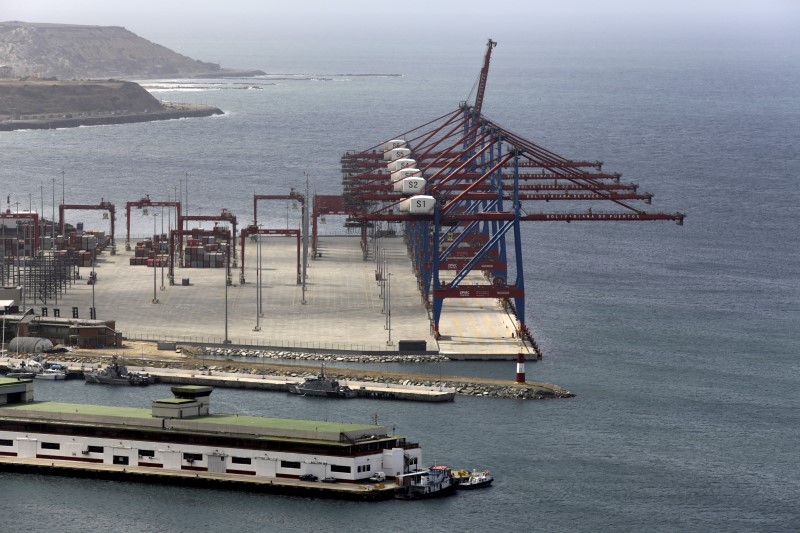By Marianna Parraga
HOUSTON (Reuters) - Venezuela has not been able to import all the crude and fuel it needs this year to cover shortfalls at oilfields and refineries as state-run PDVSA struggles to pay suppliers on time, according to trade sources and internal company data seen exclusively by Reuters.
The decline is the largest in five years as the worst economic crisis in decades undermines PDVSA's ability to buy oil imports, which fell 21 percent in the first seven months of this year to 154,465 barrels per day (bpd), the data showed.
Venezuela is also on track to suffer its steepest annual oil output drop in 14 years after years of state mismanagement and under investment.
Risk-averse suppliers are refusing to discharge cargoes to cash-strapped PDVSA without being paid first, unusual in an industry in which buyers normally have 30 to 60 days to pay after delivery. Others have stopped dealing with PDVSA entirely as it resorts to bartering its own oil in swap deals, according to traders and a company source who was not authorized to speak publicly.
"We have no more access to purchases under any type of credit. We are importing under two mechanisms: prepayment and swap," said the source, who did not want to be identified.
PDVSA's oil import needs started growing in 2012 after a severe explosion hit its largest refining complex, Paraguana. Output since then has been hobbled.
Despite having the world's largest crude reserves, Venezuela's purchases grew further in 2015 as a decline in crude production forced the company to carry out regular imports of lighter crudes and naphtha to dilute its extra heavy oil into exportable grades.
But in 2016 the trend of rising imports has been upended as PDVSA grapples with a cash crunch that has also raised risk premiums on its debt bonds.
PDVSA, which does not regularly disclose figures on imports, did not answer a request for comment.
A 10 percent decline in domestic demand for gasoline and diesel, reported by the country's fuel retailers, has partially mitigated the need for imports.
In 2016, PDVSA's base of suppliers has fallen to 13 from 19 in 2015, the data show, as sellers grow skittish.
Shipments received this year have come from Royal Dutch Shell (LON:RDSa), Reliance Industries, Total, ENI (MI:ENI), Helsinge, Gunvor, Lukoil, Rosneft, BP (LON:BP), PetroChina, ChinaOil, Citizens Resources and PDVSA's unit Citgo Petroleum, the company data say.
Some providers, including Reliance, Lukoil and Rosneft, have accepted swap deals, picking up Venezuelan oil in exchange for refined products, according to the data.
CASH OR BARTER
Swaps appear to be going more smoothly than cash purchases.
Two tankers carrying some 1.5 million barrels of U.S. light crude sold by BP have been anchored for more than two months around PDVSA's terminal in the island of Curacao, waiting for payments before discharging, according to trade sources and Thomson Reuters vessel tracking data.
Those delayed tankers are the last in a group of 12 that were discharged after facing long holdups.
The payment issues have driven a 34 percent decline this year to 51,350 bpd in imports of naphtha PDVSA uses as a diluent. That has contributed to a 5 percent drop in crude exports to 1.42 million bpd, the internal data showed.
Excluding a few specialty components such as alkylate that Venezuela has always imported to formulate finished fuels, most products received this year have been bought to cover deficiencies in refining output.
At the end of June, PDVSA's Paraguana refining center was working at around half of its capacity of 955,000 bpd, according to an internal report quoted by union representatives.
Products such as catalytic naphtha, ultra-low sulfur diesel (ULSD), gasoil for power generation, gasoline blend stock and base oils have been imported by PDVSA in 27 cargoes this year, mostly bought on the open market.
The only fuel to see a rise in imports this year was liquefied petroleum gas (LPG), used as cooking gas in Venezuela. PDVSA has bought 38 cargoes of it from PetroChina.
In the past, its refineries were able to fully cover domestic needs for these fuels.
Even after being increased this year, Venezuela's retail fuel prices are the lowest in the world and are subsidized by PDVSA.
